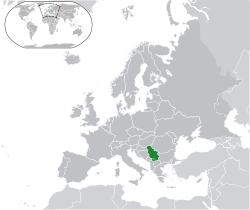Less Than Half Serbs Now Want To Join EU
By Marija Ristic
A new survey shows that support for EU membership has now dropped below 50 per cent – but the percentage of those opposed to EU membership has also dropped, presenting a mixed picture overall.
If a referendum on EU membership bid was held now, 49 per cent of Serbians who took part in a survey would say yes to joining, 25 per cent would say no, 19 per cent would not vote, and 8 per cent are not sure what their answer would be.
Such are the results of the latest survey of the Serbian Government’s European Integration Office.

Compared to the last survey in 2011, support for joining the EU fell by 2 per cent, though the percentage of those who are against joining the EU also dropped, by 3 per cent.
The head of the EU Office who conducted the survey, Milan Pajevic, sounded upbeat, saying that the results were “remarkable, bearing in mind the difficulties that the country is facing”.
“Support for the EU has dropped. But this is understandable if we keep in mind the extraordinary challenges that citizens have faced in the last years,” Pajevic told Radio Belgrade.
“We are impressed that two-thirds of the respondents support the reforms that we [in Serbia] are conducting, regardless of whether the EU requested them or not,” he added.
According to the survey, 41 per cent of citizens believe the fight against corruption is one of the most important challenges, as it directly affects their lives.
Of 1,038 respondents, 41 per cent see the issue of the former province of Kosovo, which declared independence in 2008, as the main obstacle blocking Serbia’s path towards the EU.
But 62 per cent of citizens believe that the problems between Belgrade and Pristina should be solved, regardless of whether it is requested by the EU.
Suzana Grubjesic, Vice President of the Serbian Government, in charge of EU integration, says the results of the survey are a consequence of the failure of earlier reforms.
“Since [EU] visa liberalization, people have not felt any improvement… related to their everyday life,” Grubjesic noted.
“Our goal should not be [satisfying] Brussels, but internal reforms that aim to improve the lives of citizens in line with European standards,” she added.
